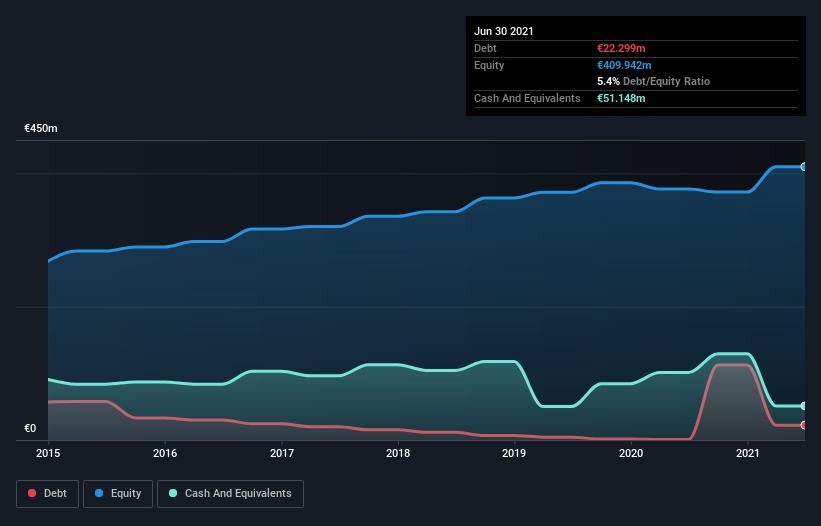
Warren Buffett famously said, 'Volatility is far from synonymous with risk.' When we think about how risky a company is, we always like to look at its use of debt, since debt overload can lead to ruin. Importantly, Vetoquinol SA (EPA:VETO) does carry debt. But the more important question is: how much risk is that debt creating?
When Is Debt A Problem?
Debt is a tool to help businesses grow, but if a business is incapable of paying off its lenders, then it exists at their mercy. Ultimately, if the company can't fulfill its legal obligations to repay debt, shareholders could walk away with nothing. However, a more common (but still painful) scenario is that it has to raise new equity capital at a low price, thus permanently diluting shareholders. Of course, debt can be an important tool in businesses, particularly capital heavy businesses. When we examine debt levels, we first consider both cash and debt levels, together.
Check out our latest analysis for Vetoquinol
What Is Vetoquinol's Net Debt?
The image below, which you can click on for greater detail, shows that at June 2021 Vetoquinol had debt of €22.3m, up from €741.0k in one year. But it also has €51.1m in cash to offset that, meaning it has €28.8m net cash.

How Healthy Is Vetoquinol's Balance Sheet?
Zooming in on the latest balance sheet data, we can see that Vetoquinol had liabilities of €155.8m due within 12 months and liabilities of €35.7m due beyond that. Offsetting this, it had €51.1m in cash and €93.5m in receivables that were due within 12 months. So its liabilities outweigh the sum of its cash and (near-term) receivables by €46.9m.
Since publicly traded Vetoquinol shares are worth a total of €1.61b, it seems unlikely that this level of liabilities would be a major threat. However, we do think it is worth keeping an eye on its balance sheet strength, as it may change over time. While it does have liabilities worth noting, Vetoquinol also has more cash than debt, so we're pretty confident it can manage its debt safely.
In addition to that, we're happy to report that Vetoquinol has boosted its EBIT by 57%, thus reducing the spectre of future debt repayments. There's no doubt that we learn most about debt from the balance sheet. But ultimately the future profitability of the business will decide if Vetoquinol can strengthen its balance sheet over time. So if you're focused on the future you can check out this free report showing analyst profit forecasts.
Finally, while the tax-man may adore accounting profits, lenders only accept cold hard cash. While Vetoquinol has net cash on its balance sheet, it's still worth taking a look at its ability to convert earnings before interest and tax (EBIT) to free cash flow, to help us understand how quickly it is building (or eroding) that cash balance. In the last three years, Vetoquinol created free cash flow amounting to 13% of its EBIT, an uninspiring performance. For us, cash conversion that low sparks a little paranoia about is ability to extinguish debt.
Summing up
While it is always sensible to look at a company's total liabilities, it is very reassuring that Vetoquinol has €28.8m in net cash. And we liked the look of last year's 57% year-on-year EBIT growth. So we don't think Vetoquinol's use of debt is risky. There's no doubt that we learn most about debt from the balance sheet. But ultimately, every company can contain risks that exist outside of the balance sheet. For example, we've discovered 1 warning sign for Vetoquinol that you should be aware of before investing here.
If, after all that, you're more interested in a fast growing company with a rock-solid balance sheet, then check out our list of net cash growth stocks without delay.
New: Manage All Your Stock Portfolios in One Place
We've created the ultimate portfolio companion for stock investors, and it's free.
• Connect an unlimited number of Portfolios and see your total in one currency
• Be alerted to new Warning Signs or Risks via email or mobile
• Track the Fair Value of your stocks
This article by Simply Wall St is general in nature. We provide commentary based on historical data and analyst forecasts only using an unbiased methodology and our articles are not intended to be financial advice. It does not constitute a recommendation to buy or sell any stock, and does not take account of your objectives, or your financial situation. We aim to bring you long-term focused analysis driven by fundamental data. Note that our analysis may not factor in the latest price-sensitive company announcements or qualitative material. Simply Wall St has no position in any stocks mentioned.
Have feedback on this article? Concerned about the content? Get in touch with us directly. Alternatively, email editorial-team (at) simplywallst.com.
About ENXTPA:VETO
Vetoquinol
A veterinary pharmaceutical company, designs, develops, and sells veterinary drugs and non-medicinal products in Europe, the Americas, and the Asia Pacific region.
Undervalued with excellent balance sheet.
Similar Companies
Market Insights
Community Narratives




